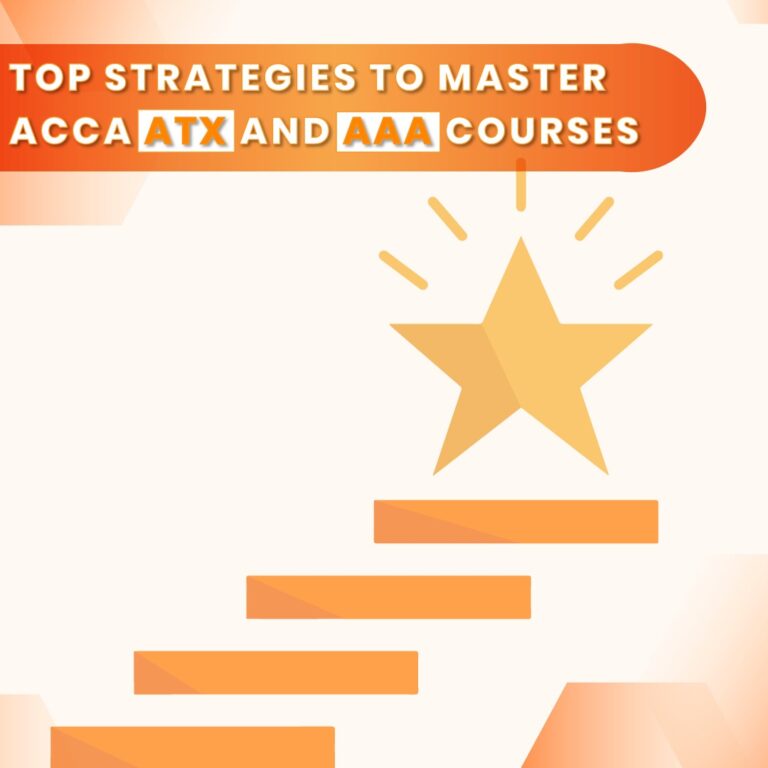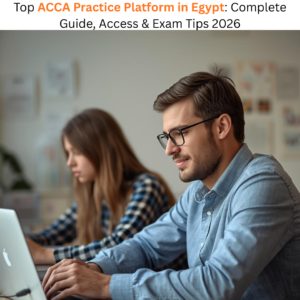INTRODUCTION:
ATX (Advanced Taxation) and AAA (Advanced Audit and Assurance) are the courses of ACCA, and both of them are from the Strategic Professional level. These are considered to be some of the most advanced and complex courses of the qualification. Therefore, students tend to feel anxious about preparing for and cracking the ACCA ATX and AAA exams. However, the right strategies, innovative learning techniques, and a deep understanding of complex real-world financial problems can help students in mastering the ACCA ATX and ACCA AAA exams.
If you are in the same boat, looking for a practical pathway to follow and achieve success in the respective exams of ACCA. This blog will provide you with all the effective strategies and learning techniques to crack the ACCA ATX and ACCA AAA exams.
BASIC STRATEGIES FOR BOTH ACCA ATX AND AAA EXAMS:
KNOW THE EXAM FORMAT:
Before starting your academic journey and appearing in exams, it is quite essential to understand and analyze the format of the exam. Preparing yourself with practice papers, mock exams, and reading examiners’ reports can be quite helpful in understanding exam structure, mark allocation, types of questions, and time management. Considering and working on all these factors is important for aspirants who aim to achieve success in the ACCA ATX and AAA exams.
MASTERING TECHNICAL KNOWLEDGE:
Those who know about the ACCA qualification are well aware that it emphasizes learning modern technical skills alongside academic knowledge. In particular, the ACCA ATX and AAA courses demand that aspirants have technical skills to deal with real-world financial problems. The exams of ACCA ATX and AAA exams include case studies and descriptive scenario-based questions to examine how solid your technical skills and understanding of accounting principles are. Therefore, aspirants are advised to focus on enhancing their technical skills to perform better in these exams.
PRACTICE PROFESSIONAL SKILLS:
ACCA AAA and ATX exams include real-world problems and require you to propose a solution to them. To structure a good answer, the aspirant should have strong professional skills. These skills include critical thinking, communication skills, analytical skills, and skepticism. To learn these skills and give an outstanding academic performance, students can practice by writing reports, structured responses, and memos.
EFFECTIVE TIME MANAGEMENT:
The exams of ACCA AAA and ATX are quite descriptive and complex; hence, it is crucial to have good time management skills to complete the exam on time. Aspirants can master time management by allocating time to each question depending on the weightage of marks. Other than that, to accelerate their writing speed, they should start practicing mock exams.
USE ACCA RESOURCES:
ACCA resources are the most feasible way of preparing yourself for complex exams such as AAA and ATX. These resources include past exams, study materials, textbooks, examiner’s reports, guides, and technical articles. Make sure to use ACCA-approved resources; you can find these resources easily online or from the ACCA learning institute you are associated with.
STRATEGIES FOR THE ACCA ATX EXAM:
CURRENT LEGISLATION KNOWLEDGE:
While appearing in the ACCA ATX exam, it is extremely important to stay up to date with any changes made in regulations or standards of taxation. Make sure you use the correct and current finance act in your exam; rather than just memorizing the tax laws, concentrate on learning how and where to apply them.
APPLY, DON’T JUST CALCULATE:
The advanced taxation (ATX) exam is structured not to examine your calculations but to focus mainly on the analysis and advice you put forward. Aspirants who aim to produce outstanding results in the ACCA ATX exam should avoid number crunching only and explain the rationale behind the tax enforcement.
FOCUS ON ETHICS AND PROFESSIONAL JUDGMENT:
ACCA values ethical and professional skills a lot, sure to showcase your ethical skills while dealing with any questions or scenarios regarding financial dealings. For example, there is a client scenario with ethical issues, make sure to highlight it. And use professional and formal language to construct an answer in such scenarios.
STAY UPDATED WITH TAX ARTICLES:
Tax articles published by ACCA Global are quite effective in preparing yourself for the ACCA ATX exam as they reflect upcoming exam content. Utilizing these tax articles can provide you with a bit of exam insights (structure, format, nature of questions, etc).
STRATEGIES FOR THE ACCA AAA EXAM:
UNDERSTANDING OF RISK AND STANDARDS:
To achieve success in the Advanced Audit and Assurance exam, you should have an in-depth understanding of the International Standards on Auditing (ISAs). Make sure to follow these standards and stay updated with any changes made. Apart from that, you should be able to examine, assess, and explain audit procedures, risks, responses, etc.
THINK LIKE A SENIOR AUDITOR:
The ACCA AAA exam is an advanced-level exam in which you are being tested for higher-level auditing roles; therefore, you should showcase your exceptional skills in planning, evaluating evidence, and forming suggestions. Think of yourself as a professional and deal with the scenarios in the same manner.
CASE-BASED PRACTICE:
The exam of AAA is completely based on real-world scenarios and case studies; hence, aspirants should start practicing case studies regularly to showcase their extraordinary performance. Additionally, keep in mind that the responses to each case study might differ depending on the client or industry background.
INTEGRATE CURRENT AFFAIRS:
To make your answers more appealing, you can use examples of current regulatory changes, audit reform debates, and corporate failures. Integrating these examples with your answers could be quite helpful to support your answers and make them stand out.
CONCLUSION:
Cracking these complex exams of ACCA ATX and AAA can be quite challenging for students but it is not completely impossible. With the right strategies, consistency, and determination, one can easily achieve success in these exams. Make sure you are using smart learning techniques and integrating all the strategies while practicing and appearing in exams.
FREQUENTLY ASKED QUESTIONS (FAQs):
Q: Which paper is harder, ATX or AAA?
Ans: To some, ATX is easier and vice versa; it completely depends on an individual’s interests and strengths. ATX is more focused on technical aspects such as calculations, tax regulations, etc. Whereas AAA focuses more on professional skills such as analysis, application, judgment, suggestions, and communication skills. Therefore, the level of difficulty of each exam depends on your skills.
Q: How much time should I dedicate to each paper?
Ans: If you are preparing for the ACCA ATX and AAA exams, you should at least dedicate 140-180 hours to each exam. These hours should be covered within the period of 12-14 weeks; inconsistency in between can create hurdles in achieving your desired outcomes.





